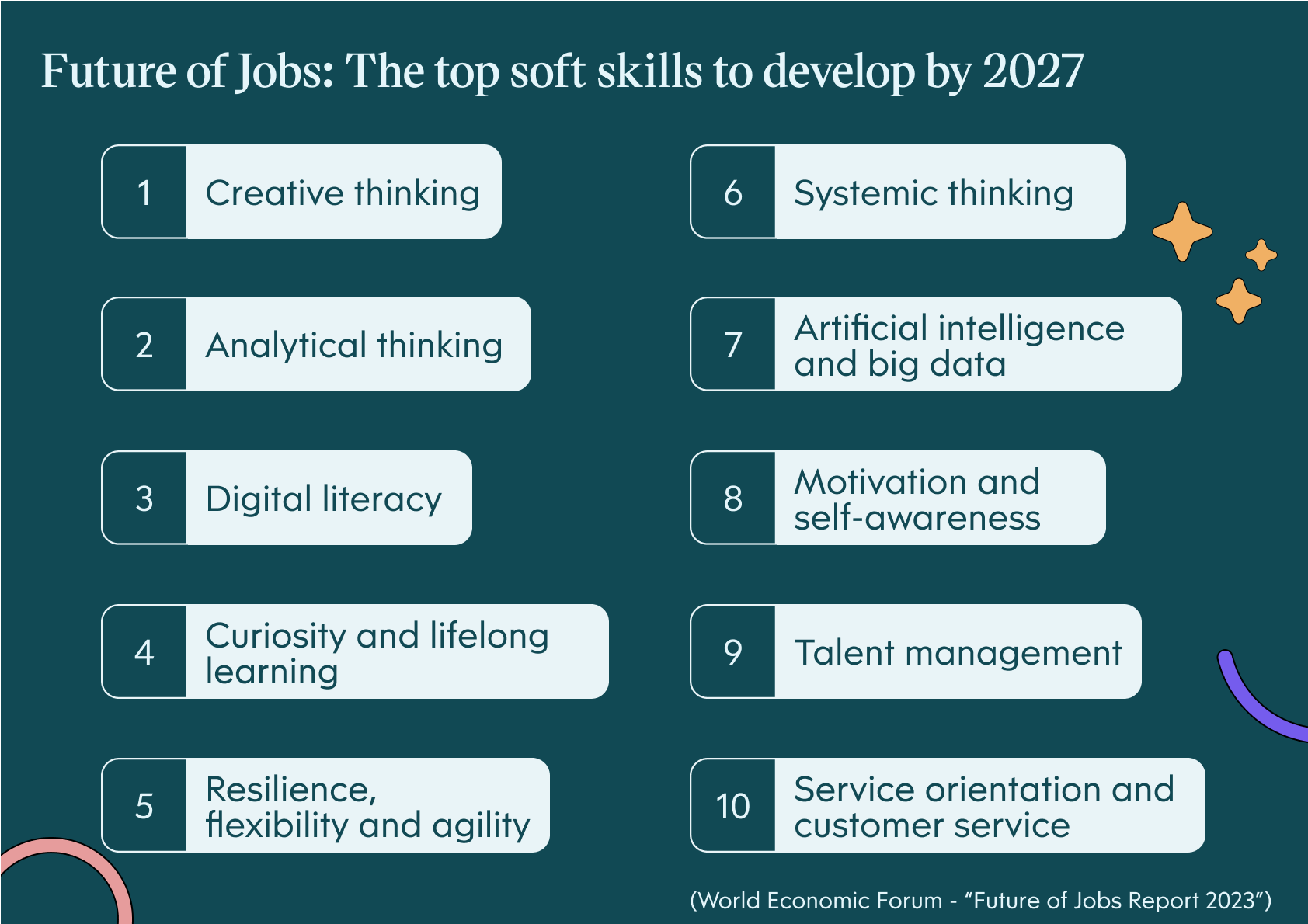The top soft skills to develop by 2027: “Future of Jobs”, World Economic Forum 2023 report
Learning Innovation
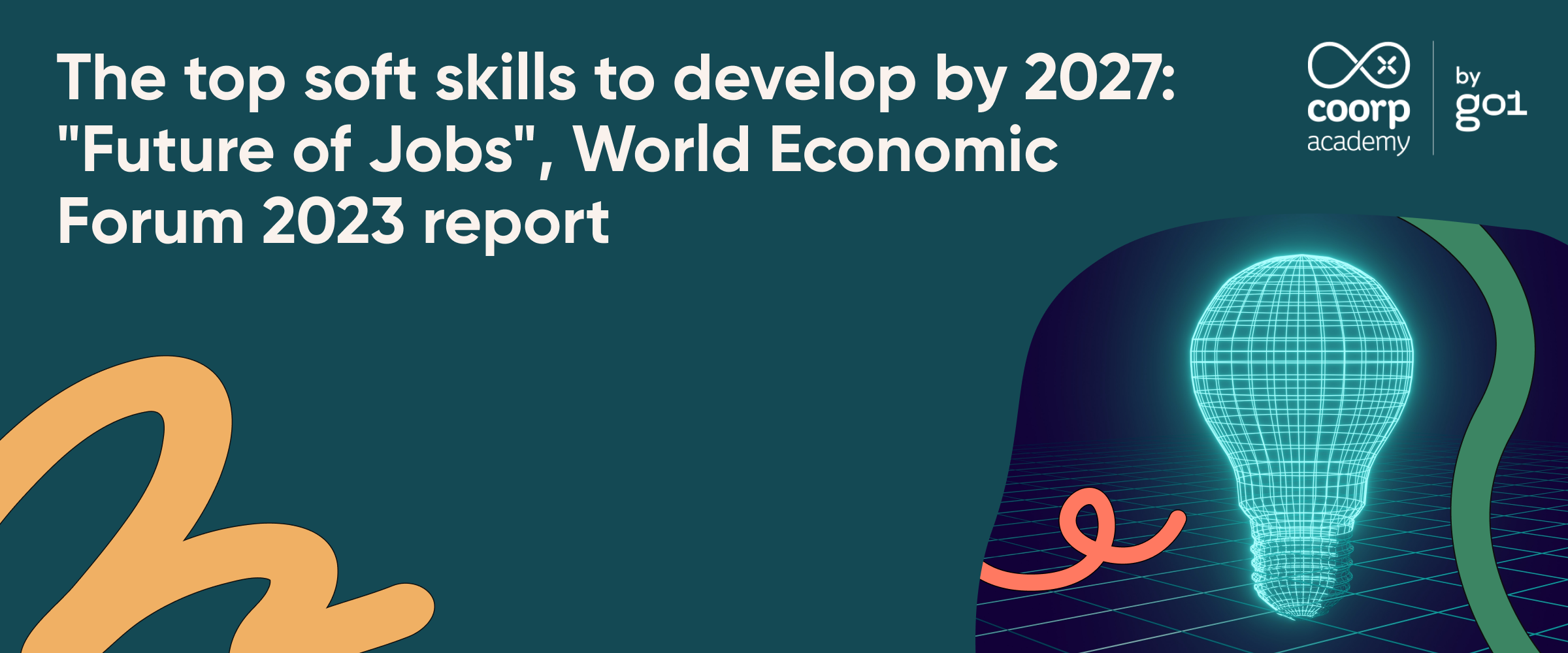
The World Economic Forum (WEF) published the “Future of Jobs Report 2023” on April 30, 2023. This fourth edition follows trends in the future of employment and provides essential information to guide and prepare employers and employees for the ongoing changes.
Workplace is changing rapidly and so are the skills required to be successful and employable. Employers are looking for people who possess not only technical skills, but also behavioral skills or “soft skills”.
You can discover the full report, otherwise stay on this page, we summarize the report in 5 key points:
1-Soft skills, a human-sized asset in the face of Artificial Intelligence (AI)
According to the WEF report, technology adoption will remain a key driver of business transformation over the next five years. While machines and algorithms can automate many repetitive tasks, jobs that require human skills such as creativity, collaboration, communication, problem solving and empathy will continue to grow. Soft skills radically differentiate us from Artificial Intelligence, which is why as these advanced technologies evolve, the demand for soft skills is increasing (by 53% according to the latest Coorpacademy by Go1 with Féfaur survey, published in April 2023).
Emerging technologies such as generative AI are redefining workforce demands, and employers are placing greater emphasis on “soft” skills. These skills enable companies to respond to change and automation. Socio-emotional skills became increasingly important between 2017 and 2023, with the exception of a brief shift back to technical skills during periods of labor market downturns that were due to Covid-19 during 2020.
The technologies most likely to be adopted are big data, cloud computing, education technologies and AI. More than 75 percent of companies plan to adopt these technologies in the next five years. The technologies most likely to disrupt jobs are digital platforms and apps, e-commerce and digital business, and AI.
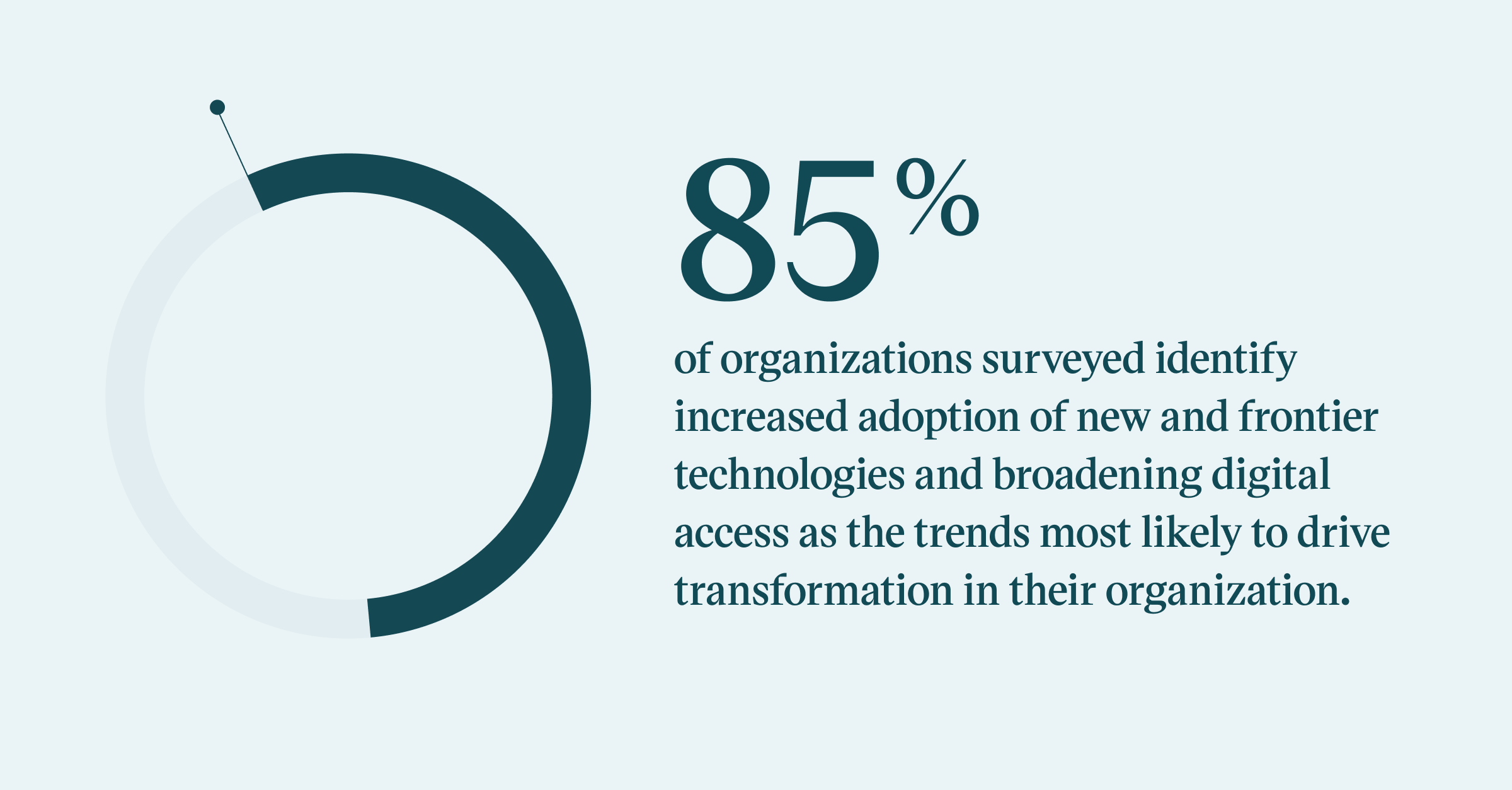
2- Soft skills become key levers to adapt to change
In an ever-changing world, it is important to be able to adapt quickly to change. The world is changing so fast that it is even referred to as a “VUCA” environment: an acronym for volatility, uncertainty, complexity and ambiguity. So it’s not just in our heads! But a real and accelerating phenomenon. People with good problem solving, critical thinking and decision making skills will be able to deal with the challenges and opportunities they face.
Since the health crisis and the advent of remote work, companies are asking their talent to be able to collaborate remotely, whether with colleagues, business partners and customers. Employers are looking for people who can work in teams, communicate clearly and listen to others.
Finally, employers are looking for people who can lead teams and guide others. To do so, leadership skills, such as the ability to communicate effectively, motivate others and resolve conflict, are increasingly in demand.
3- Soft skills improve employee satisfaction and productivity
Employees with good behavioral skills are often happier and more productive in their jobs. This can help improve company efficiency and reduce employee turnover.
The more than 800 companies surveyed in the report indicate that investing in learning and professional development is a common strategy for achieving their organization’s business goals. Four out of five respondents plan to implement this strategy in the next five years. Skills development is most often seen as the responsibility of employees and managers, yet to multiply the impact of training, it must be embedded in the company’s strategy at the highest level.
4- Time is running out: get trained before it’s too late
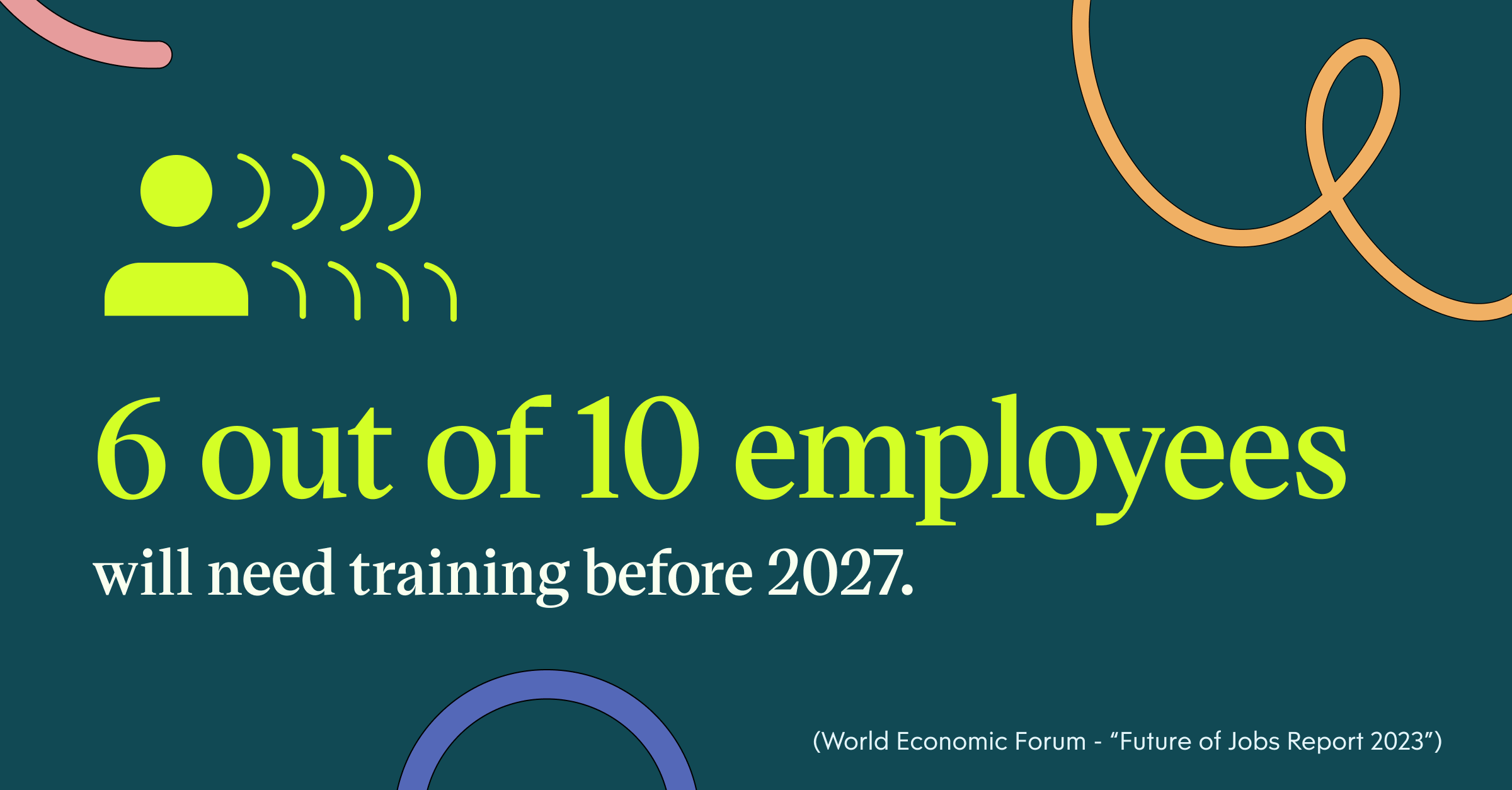
Six out of ten employees will need training before 2027, but only half of them appear to have access to adequate training opportunities today. Between 2023 and 2027, the top training priority is analytical thinking, which is expected to account for 10% of training initiatives on average. The second is to promote creative thinking, which will be the focus of 8% of training initiatives. Training in the use of AI and big data ranks as the third highest priority for companies to build skills over the next five years and will be favored by 42% of companies surveyed. Employers also plan to focus on developing employees’ soft skills, i.e., leadership and social influence (40% of companies), resilience, flexibility and agility (32%), and curiosity and lifelong learning (30%). Two-thirds of companies expect a return on investment from professional development within one year of the investment, whether in the form of increased mobility between roles, greater employee satisfaction or improved productivity.
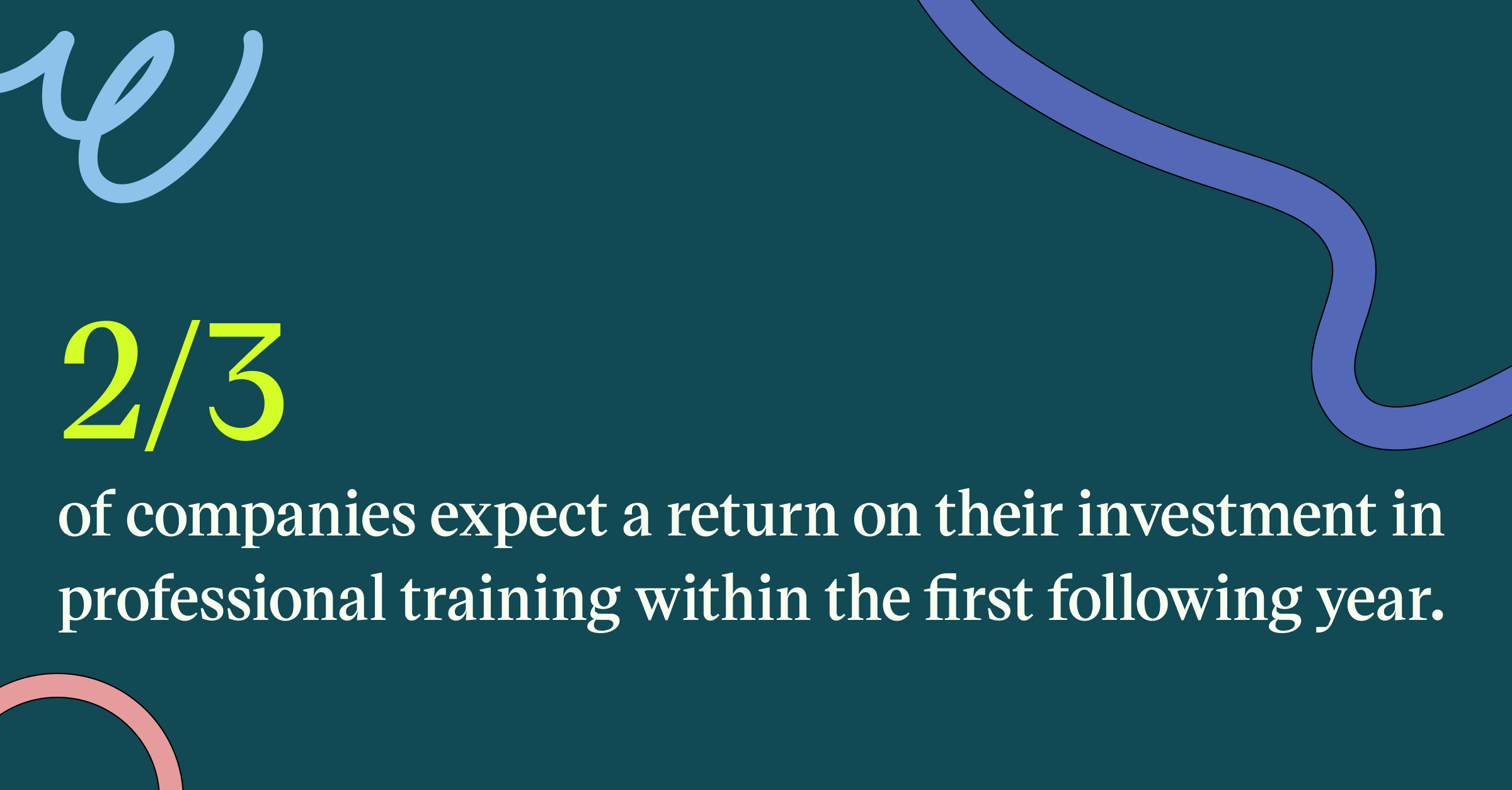
Companies also expect that investment in the ecological transition and adaptation to climate change will have an impact on employment. In particular, they will ask employees to develop new skills in the area of sustainable development, known as green skills. LinkedIn’s “Global Green Skills Report 2022” published in 2022 gives the following definition: “Green skills are those that ensure the environmental sustainability of economic activities”. The same report also tells us that the share of “green” talent in the workforce has grown from 9.6% in 2015 to 13.3% in 2022 (a growth rate of 38.5%).
5- Reshuffling the skills’ deck
Employers estimate that 44% of employee skills will be disrupted over the next five years. Cognitive skills are growing in importance the fastest, supporting the need for complex problem solving in the workplace.
According to the report, several skills are seeing a significant boost in importance. Companies surveyed indicate that creative thinking is gaining in importance slightly faster than analytical thinking. Technology literacy is the third fastest growing core competency in importance. Self-efficacy skills rank ahead of teamwork as the fastest growing skill. The socio-emotional attitudes that companies rank as the fastest growing in importance are curiosity and lifelong learning, resilience, flexibility and agility, and motivation and self-awareness. Systems thinking, AI and big data, talent management, and customer service round out the top growing skills. While respondents do not consider any skills to be in net decline, a minority of companies, but a significant one nonetheless, believe that reading, writing and math; the ability to keep one’s cool; manual dexterity, stamina and accuracy are becoming less of a priority for their employees.
45% of companies believe that investing in skills development is effective in connecting talent to jobs. Among actions government can take to promote employment, funding job training ranks ahead of flexibility in hiring and firing practices (33%), tax and other incentives for companies to improve wages (33%), improving school systems (31%) and changing immigration laws for foreign talent (28%).
In conclusion, soft skills are increasingly important in the future of work. Employers are looking for people who possess behavioral skills such as collaboration, communication, problem solving and leadership. People with these skills are better prepared to meet the challenges and opportunities of an ever-changing world.
But then, what are the 10 soft skills to develop by 2027?
